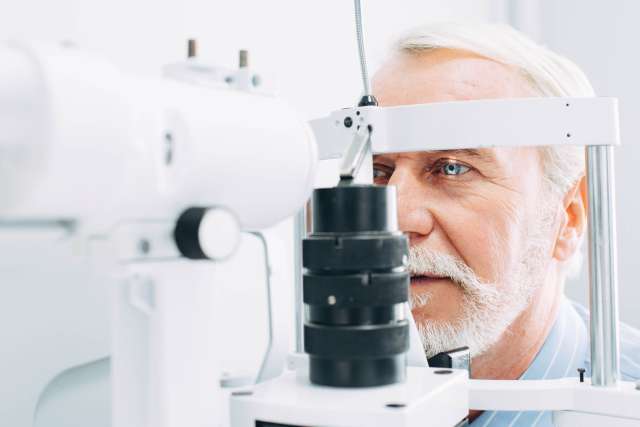Neuro-Ophthalmology Care
Our neuro-ophthalmologists and neuro-optometrists provide advanced, patient-centered care with a team approach.

Why Choose UCLA Health for Neuro-Ophthalmology Care?
Our neuro-ophthalmologists provide comprehensive management for neurologic diseases that may affect your field of vision and eye movements. We also treat optic nerve diseases, which affect the nerve that carries visual information to your brain. Our specialists are part of the UCLA Health Stein Eye Institute and Doheny Eye Centers, which consistently ranks among the best ophthalmology programs in the nation, according to U.S. News & World Report.
Highlights of our program include:
Team-based care: Our specialists work closely with the Optic Neuropathy Center and the departments of neurology and neurosurgery to provide comprehensive care. We diagnose and treat the full range of optic nerve diseases, offering both inpatient and outpatient services.
Research emphasis: We continually research and implement new treatment options. By participating in clinical trials, eligible patients can access promising new therapies.
Advanced tools: We use state-of-the-art diagnostic tools that allow us to make accurate, detailed diagnoses. Because of our comprehensive diagnostic process, we can build effective, individualized treatment plans.
Our Areas of Care in Neuro-Ophthalmology
Neuro-ophthalmologists are doctors who specialize in eye disorders related to the nervous system and work alongside neuro-optometrists for coordinated care. Our experts provide comprehensive inpatient and outpatient care for patients with all types of nerve-related eye problems or vision loss.
Optic Neuropathy Center
Since 1991, our neuro-ophthalmologists have offered multidisciplinary treatment of complex diseases involving the optic nerve. We use advanced diagnostic tools to create the most appropriate, effective treatment plans, working closely with:
- Neurologists, brain and spine specialists
- Neuroradiologists, specialists who read images of the brain, spine and spinal cord
- Neurosurgeons, doctors who perform brain and spine surgery
- Orbital surgeons, specialists in procedures involving the eyes or eyelids
Conditions Neuro-Ophthalmologists Treat at UCLA Health
Our neuro-ophthalmologists care for patients with a wide range of conditions, including:
Brain tumors: A mass of irregular cells that grows uncontrollably and can be either cancerous (malignant) or noncancerous (benign). Tumors may press on the optic nerve, causing blurred or double vision, blind spots and gradual vision loss.
Cranial nerve palsy: Loss of function, weakness and possibly paralysis in the nerves that run from the brain to the face, head and trunk (cranial nerves). Palsies in certain cranial nerves may affect eye movements, cause eyelids to droop or lead to double vision or strabismus.
Horner syndrome: A rare disorder caused by damage in one of the nerves running from the brain to the face and eye. It often leads to eyelid drooping, decreased pupil size or decreased sweating on one side of the face.
Multiple sclerosis (MS): An autoimmune disorder in which the immune system damages the myelin, the protective covering over nerves. MS may cause optic nerve inflammation (optic neuritis), which can lead to loss of color vision, blurred vision or pain with eye movement.
Myasthenia gravis: An autoimmune disorder in which the immune system attacks and damages the communication between muscles and nerves, leading to rapid muscle weakness and fatigue. Myasthenia gravis may affect the muscles that control eyelids and eye movements, causing eyelid drooping or double vision.
Optic neuropathy: Damage to the optic nerve from any cause, including impaired blood flow, inflammation in the optic nerve (optic neuritis), a brain tumor or hereditary diseases. It can cause blurred vision, loss of color vision, blind spots, total vision loss and other symptoms.
Optic atrophy: Loss of function in some or most of the fibers in the optic nerve, often a result of optic neuropathy. It can lead to blurred or distorted vision and limited color or peripheral (side) vision.
Pseudotumor cerebri: Pressure buildup in the skull, often mimicking the symptoms of a brain tumor. It can cause blurred or double vision.
Retinal vascular disease: Conditions or injuries that block blood flow in the eye or cause fluid to leak, including retinal vein or artery occlusions, diabetic retinopathy or hypertensive retinopathy. Retinal vascular disease can cause blurred, reduced or double vision; floaters; or sudden vision loss.
Strabismus (crossed eyes): Eyes that don’t look in the same direction. It’s often caused by nerve damage or dysfunction in the eye muscles.
Neuro-Ophthalmology Treatments We Offer for Patients
Neuro-ophthalmologists create personalized treatment plans to restore your vision and improve your quality of life. Treatment may include:
- Visual aids: Magnifiers, large-print devices or audio watches can help people with vision loss.
- Medications: Corticosteroids or other medicines may help reduce inflammation to prevent further vision loss.
- Eye muscle surgery: This procedure corrects strabismus by shortening or stretching the eye muscles as needed to realign the eyes.
We also coordinate closely with neurologists and neurosurgeons to manage neurologic diseases that affect the visual system.
Meet our Team of Neuro-Ophthalmologists
Our neuro-ophthalmologists provide care for patients with all types of optic nerve conditions. We research promising treatment approaches and offer patients the most effective options.
Full-Time Faculty
Contact Us for Neuro-Ophthalmology Appointments
Call 310-825-2631 to request an appointment with a neuro-ophthalmologist at UCLA Health.
Find your care
We offer a full range of treatments for optic nerve conditions. Call 310-825-4344 for a referral and to find out more about our services.








